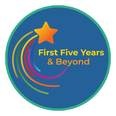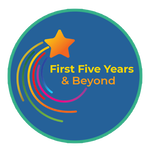Developmental Screening Program
Ages & Stages Developmental Screening Program: This program uses the Ages and Stages Questionnaires (ASQ-3 and ASQ-SE), a simple to track and monitor the communication, gross-motor, fine motor, problem-solving and social-personal skills of children birth to age 5.
First Five Years & Beyond has partnered with Help Me Grow King County to provide developmental screenings for children under the age of 5.
Science shows that the brain development begins at birth and in the early years a set of diverse skills and abilities are established making it an important time to track your child's development. Follow the growth and development of your child with our free developmental screenings to support their school readiness.
Our Developmental Screening Program uses the Ages and Stages Questionnaires (ASQ) to engage families in a meaningful and culturally respectful way in their child’s development around the South King County area. This program uses the Ages and Stages Questionnaires (ASQ-3 and ASQ-SE). These questionnaires are used to track and monitor the communication, gross-motor, fine motor, problem-solving and social-personal skills of children birth to age 5.
Developmental screening is an effective and efficient way to help parents identify their child’s milestone and celebrate those milestones and supports school readiness.
Every family looks forward to seeing a child’s first smile, first step, and first words. Regular screenings with the support of early childhood providers help raise awareness of a child’s development, making it easier to expect and celebrate developmental milestones.
Here are 3 goals:
"I am thankful for First Five Years & Beyond doing the developmental screening for my daughter (3) because, they detected signs of developmental (speech) delay early on. Had I known about this years ago, I would have done this for my son (12) who was later diagnosed with Autism Spectrum Disorder. The developmental screenings allowed for me to understand how to help my daughter succeed."
- Anonymous
Science shows that the brain development begins at birth and in the early years a set of diverse skills and abilities are established making it an important time to track your child's development. Follow the growth and development of your child with our free developmental screenings to support their school readiness.
Our Developmental Screening Program uses the Ages and Stages Questionnaires (ASQ) to engage families in a meaningful and culturally respectful way in their child’s development around the South King County area. This program uses the Ages and Stages Questionnaires (ASQ-3 and ASQ-SE). These questionnaires are used to track and monitor the communication, gross-motor, fine motor, problem-solving and social-personal skills of children birth to age 5.
Developmental screening is an effective and efficient way to help parents identify their child’s milestone and celebrate those milestones and supports school readiness.
Every family looks forward to seeing a child’s first smile, first step, and first words. Regular screenings with the support of early childhood providers help raise awareness of a child’s development, making it easier to expect and celebrate developmental milestones.
Here are 3 goals:
- Promoting universal screening: All of our children need support in the early years to make sure they stay healthy and happy. Developmental and behavioral screenings assure that children are making developmental progress, in areas such as language, social, or motor development.
- Identify possible delays and concerns early: Screenings can help kids succeed in and beyond their school years. With regular screenings, families, teachers, and other professionals can assure that young children get the services and supports they need, as early as possible to help them thrive alongside their peers.
- Enhancing developmental supports: Families are children’s first and most important teachers. Combining the love and knowledge families have of their children with tools, guidance, and tips recommended by experts, can help optimize the developmental support children receive.
"I am thankful for First Five Years & Beyond doing the developmental screening for my daughter (3) because, they detected signs of developmental (speech) delay early on. Had I known about this years ago, I would have done this for my son (12) who was later diagnosed with Autism Spectrum Disorder. The developmental screenings allowed for me to understand how to help my daughter succeed."
- Anonymous
First Five Years & Beyond offers a free, comprehensive and confidential online screening tool to help guide and keep track of your child’s growth and development during these first five years. Children develop skills and reach milestones at their own pace. How is your child doing? We encourage you to take 10–20 minutes to check with the Ages & Stages Questionnaires®, Third Edition™ (ASQ-3). You can start at any time. Based on your responses, your results will help you see if your child’s developmental progress is on time and alert you to any potential concerns that you can talk over with your health care provider.
We will ask you to come back from time to time to check in and learn more about your child’s development over time. You can use this tool when your child is at least 4-weeks-old through your child’s fifth birthday. Depending on your child’s age, you may need some props – like a ball, safety scissors or a toy. The sooner you address a developmental delay or special need, the better long-term success you can expect for your child’s overall well-being. Early intervention is key.
We will ask you to come back from time to time to check in and learn more about your child’s development over time. You can use this tool when your child is at least 4-weeks-old through your child’s fifth birthday. Depending on your child’s age, you may need some props – like a ball, safety scissors or a toy. The sooner you address a developmental delay or special need, the better long-term success you can expect for your child’s overall well-being. Early intervention is key.
*For the best experience, please take the screening on a desktop or laptop computer. Thank you!
Ages & Stages Questionnaires® is a registered trademark of Paul H. Brookes Publishing Co., Inc.
Please note: ASQ-3™ is designed for screening, not diagnosis. It is a quick check for children from birth through age five. If your child is age six or older, please discuss his or her development with your child's health care provider, your local school district, or your child's teacher. Your results from the questionnaire will be emailed to you within two weeks.
Ages & Stages Questionnaires® is a registered trademark of Paul H. Brookes Publishing Co., Inc.
Please note: ASQ-3™ is designed for screening, not diagnosis. It is a quick check for children from birth through age five. If your child is age six or older, please discuss his or her development with your child's health care provider, your local school district, or your child's teacher. Your results from the questionnaire will be emailed to you within two weeks.
promoting first relationships (pfr)
As First Five Years & Beyond continues to do developmental screenings (ASQ-3 and ASQ-SE) with families, we have enhanced our capabilities to serve children and families birth to 5 in more ways by incorporating Promoting First Relationships (PFR).
PFR is a training program through the University of Washington dedicated to promoting children's social-emotional development through responsive, nurturing caregiver-child relationships.
Providers who work with parents and other caregivers of young children have a unique opportunity to positively influence these first relationships.
They train service providers in the use of practical, in-depth, effective strategies for promoting secure and healthy relationships between caregivers and young children (birth to 5 years).
All children are born into this word totally dependent on the relationships they develop with their parents and their caregivers, the people who are closest to them. These first relationships are the foundation for young children's growth and development in social, emotional, behavioral, language and cognitive domains. We believe that parents will leave this program with a better understanding of how to foster their children's emotional growth and needs. For more information, visit their website.
"I love the PFR program because sometimes it is difficult to know how to handle meltdowns. We don't always know why they are crying. If you stay calm, there will be a better outcome." - Paulyn
"I really enjoy these conversations because it is rare for somebody to come and visit you to ask how the kids are handling the parenting approach. Tell me more, tell me more please!" - Rizecky
"I appreciate this program because it's nice that somebody can sit down with us and discuss how to strengthen the first years of childhood. It's not often people in our circle open up about it because people are always busy with the fast pace of life." - Anonymous
PFR is a training program through the University of Washington dedicated to promoting children's social-emotional development through responsive, nurturing caregiver-child relationships.
Providers who work with parents and other caregivers of young children have a unique opportunity to positively influence these first relationships.
They train service providers in the use of practical, in-depth, effective strategies for promoting secure and healthy relationships between caregivers and young children (birth to 5 years).
All children are born into this word totally dependent on the relationships they develop with their parents and their caregivers, the people who are closest to them. These first relationships are the foundation for young children's growth and development in social, emotional, behavioral, language and cognitive domains. We believe that parents will leave this program with a better understanding of how to foster their children's emotional growth and needs. For more information, visit their website.
"I love the PFR program because sometimes it is difficult to know how to handle meltdowns. We don't always know why they are crying. If you stay calm, there will be a better outcome." - Paulyn
"I really enjoy these conversations because it is rare for somebody to come and visit you to ask how the kids are handling the parenting approach. Tell me more, tell me more please!" - Rizecky
"I appreciate this program because it's nice that somebody can sit down with us and discuss how to strengthen the first years of childhood. It's not often people in our circle open up about it because people are always busy with the fast pace of life." - Anonymous

